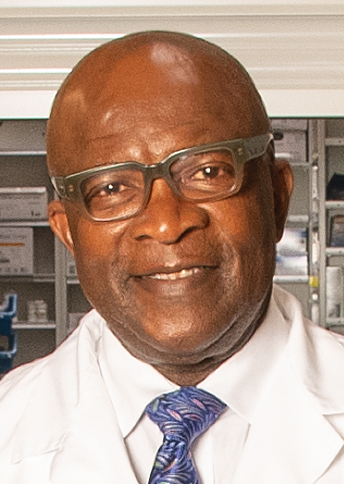I am NCPA
Arthur Metu, RPh
 PHARMACY: CEO and pharmacist-in-charge, Capital City Pharmacy, Vallejo, Calif.
PHARMACY: CEO and pharmacist-in-charge, Capital City Pharmacy, Vallejo, Calif.
EDUCATION: Bachelor's in pharmacy, University of Nigeria
PRODUCTS/SERVICES OFFERED The 2,000 square foot pharmacy has a front end that carries OTC products, personal care products, feminine care, and first aid products. The staff of five dispenses about 90 prescriptions daily.
AN UNUSUAL JOURNEY: After earning his degree, which was part of a five-year program, Arthur did an internship at a hospital, taught pharmacology at a school of nursing, and completed a year of mandatory youth service work. All that meant it took him seven years to actually get to work as a pharmacist. He began working for a small community pharmacy in Lagos and then for a multinational, where he eventually served as the national sales manager for Nigeria.
Then, Arthur moved to the U.S. and passed the California Board of Pharmacy exam 10 years after graduating from pharmacy school. He worked for several other pharmacies, including Walgreens during the height of the AIDS crisis. Now, he's nearing his 10th year owning Capital City Pharmacy.
FINDING A HOME IN VALLEJO: "I didn't intend to come to Vallejo originally. For some reason, any time I started a venture, I always wound up in Vallejo," Arthur says.
"Every inner city, as you know, has its challenges, but they also have the most need. Downtown Vallejo had the most need, so we decided to locate here. On the business side, it was probably not the best location for us, but it had the most need, and that's why we're here," he says.
THE ART OF PATIENT CARE: Arthur says that providing vaccinations during the COVID-19 pandemic was the height of his career. His landlord allowed him to fill the space of a former art gallery with seating and timers to accommodate several patients at once, for five months, free of charge. The former gallery owners brought some of the art back in, too. In three months, his location had administered 4,000 shots.
PROFESSIONAL SATISFACTION: "The pinnacle of pharmacy practice, the pharmacy profession, is community pharmacy. That's what most people know a pharmacist to be, a community pharmacy. I've worked in manufacturing and I've worked in sales. I decided to do community pharmacy because it is what calls to me," Arthur says.
"Of all the jobs I've done, for all the positions that I've occupied in pharmacy, there has been none that has given me the professional satisfaction that being a community pharmacist in Vallejo has given me," he says.
CROOKED REFEREES: Arthur says the scant reimbursements from PBMs have almost put him out of business several times.
"What the government has allowed to happen is like, you have a game between the 49ers and the Dallas Cowboys, and you make the coach of the 49ers the referee for the game," he says. "The PBMs have come up with all types of computations and mechanisms as to how payment should be made. No matter how you calculate it, the bottom line is that the pharmacist should not pay for the patient."
Arthur adds, "I wish one of them could come and defend their reimbursements to me, walk with me from the point where I receive a prescription, do the necessary DUR review on that prescription, have the prescription typed, have it bottled, verified and up to the pharmacy counter, and justify a reimbursement or a fee of 50 cents to the average pharmacist. We'd make more money selling hamburgers."
THE VALUE OF NCPA: "NCPA is the only independent arbiter that we have today. Without NCPA, who would collate these various moving pieces of legislation?" Arthur says. "Who would speak for us? NCPA is the voice of community pharmacy. I don't know anybody who holds on to that rein so consistently and so vigorously and so aggressively and so justifiably."
America’s Pharmacist
September Issue Feature
A shot of success
Bremo Pharmacy’s immunization program has become a cornerstone of its business.
